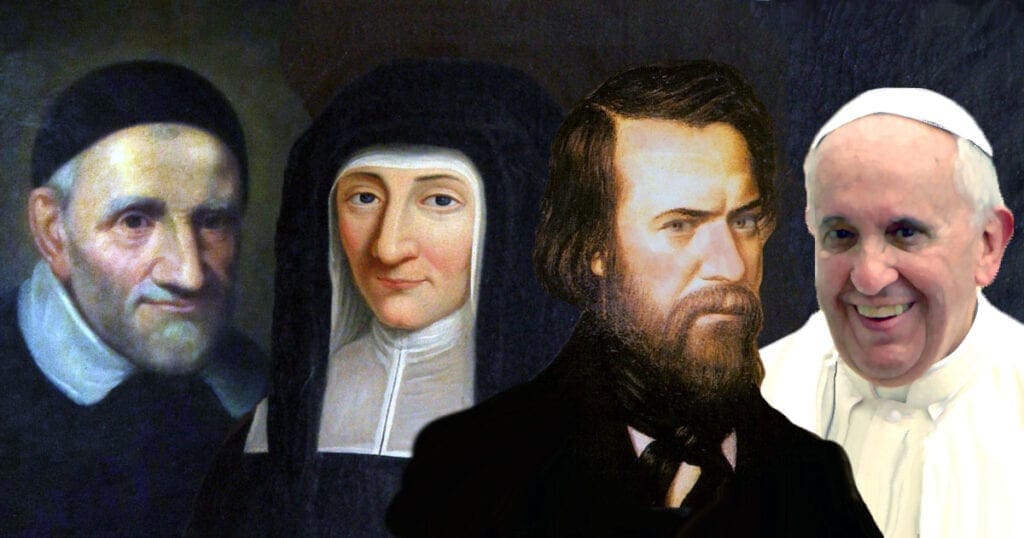It seems to be very clear that Vincent de Paul viewed evangelization as a process that involved ministering to the physical and spiritual needs of the poor. When speaking with the members of the Confraternities Vincent understood that it could be easy for them to focus on people’s physical needs, and so he told them: Because the aim of this organization [the Confraternity of Charity] is not only to assist poor persons corporally, but spiritually as well, the Servants of the Poor will strive and take great pains to dispose those who seem to be approaching death, to die well. They will arrange their visit for this purpose and pray often for that, making some little elevation of their hearts to God for this intention (CCD:XIIIb:14).

Then, while speaking to the Daughters of Charity who encountered people in various situations of desperation, Vincent felt the need to be more explicit about their ministry: Do you think, Sisters, that God expects you simply to bring His poor persons a piece of bread, a little meat, some soup, and some medicine? Oh no, Sisters! that was not his plan in choosing you from all eternity to render Him the services you do for Him in the person of the poor. He expects you to provide for their spiritual needs as well as for those of the body. They need heavenly manna; they need the Spirit of God (CCD:IX:189).
When speaking to the Missionaries who might be tempted to view their ministry as one of tending to the spiritual needs of people, Vincent stated: If there are any among us who think they are in the Mission to evangelize poor people but not to alleviate their sufferings, to take care of their spiritual needs but not their temporal ones, I reply that we have to help them and have them assisted in every way, by us and by others, if we want to hear those pleasing words of the Sovereign Judge of the living and the dead, “Come, beloved of my Father; possess the kingdom that has been prepared for you, because I was hungry and you gave me to eat; I was naked and you clothed me; sick and you assisted me.” To do this is to preach the Gospel by words and by works (CCD:XII:77-78).
Vincent’s spiritual vision was broadened with the passage of time and his direct knowledge of the different forms of poverty was also amplified. This was the result of discovering new forms of poverty in Paris and its surrounding area, then in other parts of France, later in other parts of Europe and yes, even in other parts of the world. In 1617-1618 Vincent committed himself to minister on behalf of the peasants and the sick poor. Soon thereafter he began to care for the galley salves. Then as a result of his relationship with Louse de Marillac and her Daughters of Charity, the poor seemed to appear everywhere (in the film, Monsieur Vincent, those words were spoken to Vincent by a nobleman). We can begin to envision Vincent’s view of poverty by simply listing some of the different classes of poor people that became part of his life:
- 1634: the sick poor in public hospitals (Ladies of Charity, Daughters of Charity).
- 1638: abandoned children (Ladies of Charity, Daughters of Charity).
- 1639: war refugees (Daughters of Charity, Congregation of the Mission).
- 1645: Christians held captive in North Africa (Congregation of the Mission).
- 1648: the people of Madagascar (Congregation of the Mission).
- 1649: victims of the wars in Paris and the surrounding areas (Congregation of the Mission, Daughters of Charity, Ladies of Charity).
- 1650: assistance to people living in devastated areas (Congregation of the Mission, Daughters of Charity, Ladies of Charity).
- 1654: homes for the elderly (Congregation of the Mission, Daughters of Charity); wounded soldiers (Daughters of Charity).
We could add to this list the assistance that Vincent provided to literally thousands of beggars, to noble families from Ireland who were ruined and exiled, to men and women religious who were fleeing the devastation of war and living in very precarious situations.
- Who are the poor that are crying out to you today in their time of need?
- What are they saying to you and what are you saying to them?
To view other posts in this series, click here.







Thanks for sharing this information. We will continue to learn more about our Patron Saint, Vincent de Paul.